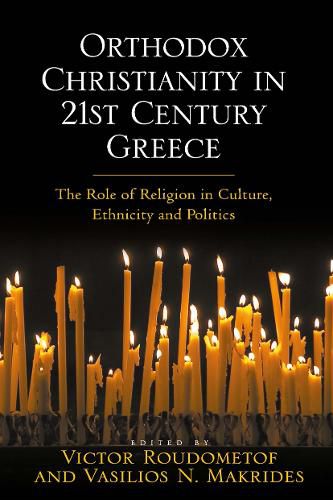Readings Newsletter
Become a Readings Member to make your shopping experience even easier.
Sign in or sign up for free!
You’re not far away from qualifying for FREE standard shipping within Australia
You’ve qualified for FREE standard shipping within Australia
The cart is loading…






One of the predominantly Orthodox countries that has never experienced communism is Greece, a country uniquely situated to offer insights about contemporary trends and developments in Orthodox Christianity. This volume offers a comprehensive treatment of the role Orthodox Christianity plays at the dawn of the twenty-first century Greece from social scientific and cultural-historical perspectives. This book breaks new ground by examining in depth the multifaceted changes that took place in the relationship between Orthodox Christianity and politics, ethnicity, gender, and popular culture. Its intention is two-fold: on the one hand, it aims at revisiting some earlier stereotypes, widespread both in academic and others circles, about the Greek Orthodox Church, its cultural specificity and its social presence, such as its alleged intrinsic non-pluralistic attitude toward non-Orthodox Others. On the other hand, it attempts to show how this fairly traditional religious system underwent significant changes in recent years affecting its public role and image, particularly as it became more and more exposed to the challenges of globalization and multiculturalism.
$9.00 standard shipping within Australia
FREE standard shipping within Australia for orders over $100.00
Express & International shipping calculated at checkout
One of the predominantly Orthodox countries that has never experienced communism is Greece, a country uniquely situated to offer insights about contemporary trends and developments in Orthodox Christianity. This volume offers a comprehensive treatment of the role Orthodox Christianity plays at the dawn of the twenty-first century Greece from social scientific and cultural-historical perspectives. This book breaks new ground by examining in depth the multifaceted changes that took place in the relationship between Orthodox Christianity and politics, ethnicity, gender, and popular culture. Its intention is two-fold: on the one hand, it aims at revisiting some earlier stereotypes, widespread both in academic and others circles, about the Greek Orthodox Church, its cultural specificity and its social presence, such as its alleged intrinsic non-pluralistic attitude toward non-Orthodox Others. On the other hand, it attempts to show how this fairly traditional religious system underwent significant changes in recent years affecting its public role and image, particularly as it became more and more exposed to the challenges of globalization and multiculturalism.